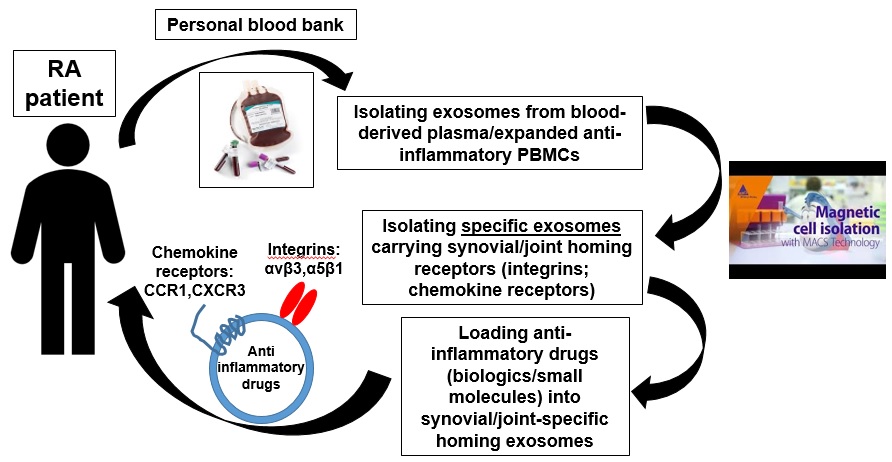Session Information
Session Type: Poster Session C
Session Time: 9:00AM-11:00AM
Background/Purpose: The use of biological treatment in patients with rheumatoid arthritis (RA) can induce non-specific immune suppression, which might result in higher rates of infections. Therefore, there are still unmet needs to develop more specific and safe therapies in the management of RA patients. Accumulating evidence suggests that extracellular vesicles (EVs) may play a role in the modulation and maintenance of autoimmune processes. In the current study, we aimed to prove that isolation of circulating autologous ’tissue-specific’ homing EVs from RA patients – may improve the delivery of current FDA-approved anti-inflammatory drugs, which will be encapsulated into these EVs. We assume that the drug-loaded EVs will find their way specifically to the inflamed tissue, following their administration to the same patient (Figure 1).
Methods: Plasma/serum-derived EVs had been isolated from arthritic mice (collagen-induced arthritis [CIA] model) and RA patients using: ultrafiltration, commercial exosome purification kit (NORGEN BIOTEK CORP) and size exclusion chromatography techniques. Characterization of these EVs have been conducted using nanoparticle tracking analysis, transition electron microscopy and western blot analysis. The expression of ’tissue-specific homing receptors’ such as integrins, on plasma/serum-derived EVs isolated from arthritic mice (CIA model) or RA patients, had been examined, using WB analysis. EVs were labelled using DiR fluorescent dye and their potential in-vivo migration towards inflamed synovia, had been explored in collagen antibody-induced arthritis (CAIA) model, using In Vivo Imaging System (IVIS). Cellular uptake of RA patients-derived labelled EVs have been conducted using SW982, a human synovial cells.
Results: We found that autologous labeled EVs, derived from blood of arthritic mice with CAIA, can migrate towards inflamed synovia. Moreover, we show that these EVs strongly expresses glucose transporter 1 (mGLUT1) which in turn, improve their therapeutic potential to be loaded with anti-inflammatory drugs using glucose-coated gold nanoparticles (GNPs). Finally, we show that EVs derived from plasma of RA patients expresses the joint/synovia-specific homing receptor αVβ3 integrin and can be taken up by LPS/TNFα-induced activated human synovial cell line in vitro.
Conclusion: Overall, we show the potential of autologous circulating EVs of RA patients to serves as natural nano-carrier for current FDA-approved drugs. We believe that this strategy will increase the specificity and efficiency of current treatment, possibly reducing side effects and will improve the quality of life of RA patients and potentially other autoimmune disease patients.
To cite this abstract in AMA style:
Halpert G, Moskovitch O, Anaki A, Caller T, Gendelman O, watad A, Mehrian-Shai R, Popovtzer R, Guilbord B, Segal O, AMITAL H. The Potential of Autologous Patient-derived Circulating Extracellular Vesicles to Improve Drug Delivery in Rheumatoid Arthritis [abstract]. Arthritis Rheumatol. 2023; 75 (suppl 9). https://acrabstracts.org/abstract/the-potential-of-autologous-patient-derived-circulating-extracellular-vesicles-to-improve-drug-delivery-in-rheumatoid-arthritis/. Accessed .« Back to ACR Convergence 2023
ACR Meeting Abstracts - https://acrabstracts.org/abstract/the-potential-of-autologous-patient-derived-circulating-extracellular-vesicles-to-improve-drug-delivery-in-rheumatoid-arthritis/

